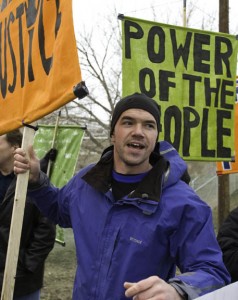 Last Thursday, a federal jury in Salt Lake City, Utah convicted activist Tim DeChristopher of two felony counts for disrupting the auction of more than 100,000 acres of federal land that was being sold off by the Bush Administration for oil and gas drilling in 2008. Tim’s act of civil disobedience has been widely heralded as courageous, heroic and, most importantly, critical to the effort to protect our air, water and climate.
Last Thursday, a federal jury in Salt Lake City, Utah convicted activist Tim DeChristopher of two felony counts for disrupting the auction of more than 100,000 acres of federal land that was being sold off by the Bush Administration for oil and gas drilling in 2008. Tim’s act of civil disobedience has been widely heralded as courageous, heroic and, most importantly, critical to the effort to protect our air, water and climate.
With Tim’s trial happening at the same time as the democratic uprising that is spreading across North Africa and the Middle East and the labor rights protests that are spreading across the Midwest U.S., we thought it would be a good time to ask three of the U.S. environmental movement’s savviest activists what they make of all of this. Specifically, we wondered what lessons we can draw from the peaceful uprisings happening around the world and how we can apply those lessons to the climate movement. In response, RAN’s own Rebecca Tarbotton, 350.org’s Bill McKibben and Phil Radford of Greenpeace USA had this to offer:
Dear friends,
Last week, a jury in Utah found Tim DeChristopher guilty for standing up to the oil and gas companies in an effort to protect our health and our climate.
Just in case the federal government thinks that it’s intimidating people into silence with this kind of prosecution, think again. In fact, this is precisely the sort of event that reminds us just why we need creative, nonviolent protests and mass mobilizations.
Over the last six months we’ve witnessed big changes in the world that affect our need for creative, nonviolent protest. They include:
- The wild and extreme weather that marked the end of the warmest year on record, with flooding in almost every corner of the planet;
- The complete collapse of efforts on Capitol Hill to do anything about climate change;
- The passing of the Citizens United Supreme Court decision, which grants corporations unfettered influence over our elections.
We’ve also seen a historic outpouring of people power to combat these environmental crises, reclaim our democracy and disrupt corporate influence. From the exhilarating outbreak of the freedom movement across North Africa and the Mideast to the amazing stand for democracy and worker’s rights in Wisconsin, we are seeing the strength and effectiveness that average people can have when we stand together.
There have been a growing number of inspiring examples of civil disobedience across the United States to protect the air we breathe, the water we drink and the climate that we depend on. On February 17, Greenpeace activists scaled a coal plant in Bridgeport, CT as part of an escalating campaign against the dirtiest coal plants across the country. Just five days before, one of our great environmental sages, Wendell Berry, joined a sit-in at the Kentucky governor’s office to protest mountaintop removal coal mining.
Taken together, all of this confirms our belief that we need to continue to escalate the struggle for climate action.
It is not one event but a wave of actions that trigger social change. Paul Revere was not the only rider to warn of the British advance, and many people refused to move to the back of the bus before Rosa Parks. It is actions like Tim’s that can create ripples that expand exponentially.
In a recent interview, Tim issued a challenge to all of us to seize the power we already have to make a difference:
We think we have no power when in fact we have more than enough power. Right now, we have a big enough movement to win this battle; we just need to start acting like it. That’s the message that the climate movement really needs to internalize. On an individual level, it means making the commitment that we’re going to be powerful and effective agents of change; on the movement level, it’s about making the decision that we’re really going to win this battle.
We worry sometimes that we may have waited too long to get this battle going in earnest; the science is dark, and the politics are tough. But we know, from watching our inspiring colleagues around the world who are facing great dangers head on, that the best time to act is now. Over the coming weeks, each of our organizations, working together and individually, will be pursuing a variety of strategies to try and spark more mass, direct action.
Tim DeChristopher took a brave and lonely stand; it’s time to make sure that in the future bravery comes in bigger quantities.